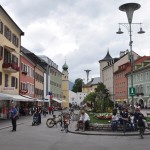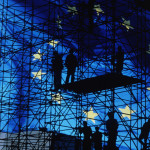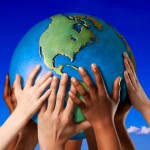After the recent declarations, the public opinion is keenly awaiting, especially in the States south of the European Union, for the reinforcement of operations in the Mediterranean sea by Frontex, the European agency for external border control.
However, there are still serious doubts about what could be the real effectiveness of the new operations, whose announcement has been coldly received by the central and northern European countries, first and foremost by Germany.
Because the point is not just financing (voluntarily) the mission, and clarifying its mandate and range of competence, but it is also about reviewing the entire management system of the right of asylum in Europe. And this issue, with the eyes of the diplomacy fixed on the Ukrainian crisis, now seems off the agenda.
But there is another much deeper anomaly, which is emerging strongly in the face of the most recent news. It is the short-sightedness of Europe, which is unable to address the issue of migration from a broader perspective, looking at its causes and not just its consequences.
To do this we should first of all look at what is happening on the south side, where we are increasingly concerned about the worsening of the crisis in Libya. A war at the gates of Europe, much closer to us than we could imagine. For an Italian, a Spaniard, or a Greek, the North African coast is much closer than Brussels, Berlin, or London.
We face a scenario that “could easily lead to a full-blown civil war if we are not very careful and wise in our actions”, as the Libyan ambassador, Mr. Ibrahim Dabashi, said to the United Nations.
A cry for help to which the Security Council responded on August 27, with a new resolution (nr.2174/2014), which merely extends the embargo on arms sales to Libya.
For their part, the European powers, after having played a decisive role in fostering the fall of Gaddafi, have retreated into their little shell, and are just acting as spectators of the transition. As if what occurred on the ground were not the consequences of their actions.
The only thing the EU has done is the approval, on May 22, 2013, of the Eubam Libyamission, with the aim to support local authorities in improving and reinforcing security along the borders (including management of migration flows). A mission that presupposed the existence of a sovereign authority in Libya, which as a matter of fact does not exist.
But which European countries today would be willing to bear the economic and political costs of a peace-building mission?
While waiting for Europe to decide its moves, the conflict between factions and power groups, between moderate and radical forces inflames the country: a recent report of the United Nations speaks of arbitrary killings, abductions of civilians, about 100,000 displaced, and 150,000 people who have been forced to leave the country after the crisis of 2011.
These clashes are reflected in the political struggle between a newly-elected Parliament (June 25, 2014), where the moderate forces are the majority, and the former National Congress, with a Muslim majority, which refuses to give up its power.
Meanwhile, Egypt and the United Arab Emirates have already intervened by bombarding some locations in Tripoli.
What is at stake is not just gas supplies, the claims of European companies, and the fate of tens of thousands of migrants who are trapped between the desert and the sea. Men, women, and children for whom Europe – with or without Frontex – remains the only escape route.
We run the risk of having a black hole at the gates of our house. On the shore of the very sea that we still rhetorically call “nostrum”, i.e. “ours”.
Dopo gli annunci delle scorse settimane cresce l’attesa, soprattutto negli Stati a Sud dell’Unione europea, per il potenziamento delle operazioni nel Mediterraneo da parte di Frontex, l’agenzia europea per il controllo delle frontiere esterne.
Restano però forti dubbi su quale potrà essere la reale efficacia della nuova operazione accolta con freddezza dai Paesi del Centro e Nord Europa, Germania in testa.
Perché non si tratta soltanto di finanziare (volontariamente) la missione, chiarendone il mandato e le competenze, ma di rivedere l’intero sistema di gestione del diritto d’asilo in Europa. Un tema che, con gli occhi della diplomazia fissi alla crisi ucraina, sembra oggi fuori dall’agenda.
Ma c’è un’altra anomalia, ben più profonda, che sta emergendo con forza di fronte alle notizie di questi ultimi giorni. Ed è la miopia di un’Europa incapace di affrontare il tema delle migrazioni da una prospettiva più ampia, che guardi alle cause e non solo alle conseguenze.
Per farlo è necessario prima di tutto guardare a quanto avviene sulla sponda Sud, dove preoccupa sempre più il degenerare della crisi libica. Una guerra alle porte dell’Europa, molto più vicina a noi di quanto potremmo immaginare: per un italiano, uno spagnolo o un greco, le coste del Nord Africa sono più vicine di Bruxelles, Berlino o Londra.
Ci troviamo ad affrontare, uno scenario che “potrebbe sfociare in una guerra civile in piena regola se non stiamo molto attenti e saggi nelle nostre azioni”, ha spiegato alle Nazioni Unite l’ambasciatore libico Ibrahim Dabashi.
Un grido d’aiuto a cui il Consiglio di sicurezza, ha risposto, il 27 agosto scorso, con una nuova risoluzione (la 2174 del 2014) che si limita ad estendere l’embargo sulla vendita di armi al Paese.
Da parte loro le potenze europee, dopo aver giocato un ruolo decisivo nel favorire la caduta di Gheddafi, si sono ritirate nel loro piccolo guscio, diventando spettatori della transizione. Come se quanto si verificava sul terreno non fosse conseguenza delle loro azioni.
L’Ue si è limitata ad approvare, il 22 maggio 2013, la missione Eubam Libya, con l’obiettivo di supportare le autorità locali nel migliorare e sviluppare la sicurezza lungo i confini (gestione dei flussi migratori compresi). Una missione che presupponeva l’esistenza di un’autorità sovrana in Libia, che di fatto non c’è.
Ma quali Paesi europei sarebbero disposti oggi a sopportarne i costi economici e politici di una missione di Peace Building?
Nell’attesa che l’Europa decida le proprie mosse, il conflitto tra fazioni e gruppi di potere, tra forze moderate e radicali infiamma il Paese: le Nazioni Unite in un recente report parlano di uccisioni arbitrarie e rapimenti ai danni dei civili, di circa 100 mila sfollati e di 150 mila persone costrette a lasciare il Paese dalla crisi del 2011.
Scontri che si riflettono nella lotta politica tra un Parlamento eletto (il 25 giugno scorso), dove le forze moderate sono maggioranza, e il precedente Congresso nazionale, dove è maggioranza la componente islamista, che si rifiuta di cedere il potere.
Intanto Egitto ed Emirati Arabi Uniti sono già intervenuti militarmente bombardando alcune postazioni a Tripoli.
A rischio non ci sono solo le forniture di gas, i crediti delle imprese europee e la sorte di decine di migliaia di migranti in trappola tra il deserto e il mare. Uomini, donne e bambini per cui l’Europa – indipendentemente da Frontex – resta l’unica via di fuga.
Il rischio è di avere un buco nero alle porte di casa. Sulla sponda di quel mare che, per retorica, continuiamo a chiamare “nostrum”.
Michele Luppi
www.africaeuropa.it
Latest posts by Michele Luppi (see all)
- How can Europe do that? - 16 aprile 2016
- A raw nerve in european consciousness - 23 luglio 2015
- The cry of the dead of Garissa - 18 aprile 2015











